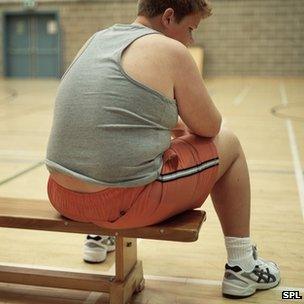Should extremely obese children be taken into care?
- Published

Some parents who have refused to address their child's obesity have seen their child taken into care
Does allowing a child to become morbidly obese qualify as child abuse? Some health and social care professionals believe it is a question that needs to be considered more seriously.
Just a few months ago, the town of Aberdare in South Wales, was the scene of a dramatic rescue.
A 19-year-old girl was pulled from her house by a crew of fire fighters - not because of a fire, but because she weighed more than 50 stone (318kg).
The girl needed urgent medical treatment but could not fit through the front door of her house and so a wall was knocked down so she could be taken to hospital.
Medics and social workers were on standby to give the girl much needed support, but the question some people have asked is why social workers did not take preventative measures - such as taking the girl into care when she was younger - before such extreme action was needed?
The question of whether extreme obesity is a child protection issue is a sensitive subject, but one which is gaining traction with some health and social care professionals.
"It is my view that child obesity should be treated as a form of child mistreatment, as any type of under-feeding is," says Joanna Nicolas, a child protection consultant who has been a social worker for 17 years.
"If a child is obese it is a form of abuse because of the physical impact on the child, the implications for their future health and the psychological impact," she told Radio 4's The Report.
"We hear time and time again that these children just don't go out anymore. They stay at home eating because they are so miserable that nobody wants to be their friend."
Ms Nicolas has personally dealt with six child protection cases where child obesity was a significant factor.
"In one case the parents were both clinically obese and their view was that there wasn't a problem and we were sticking our noses in," she says.
"Initially the child was placed on the child protection register and help and support was in place, but because of the family's unwillingness to accept there was a problem, we ended up going to court... and a decision was made by the court that the child should be removed from the parents' care."
A big decision
There are no official figures on how many children have been taken into care where obesity has been a deciding factor.
This is because hearings at the family court are rarely reported due to restrictions. Although local authorities have a duty to collect data on care proceedings, obesity cases are usually logged under the more general category of neglect.

Builders cut a hole in the wall of the home of a 60 stone teenager in order to take her to hospital
So how do social workers decide child obesity is a protection issue in the first place? What guidelines do they use to decide that a child's weight problem is so serious that they should be taken into care?
"The key criteria is whether the harm is significant in terms of the child's development and whether the harm is due to the parents or care-givers behaviour," says Colin Green from the Association of Directors of Children's Services.
"You would also be looking to medical colleagues to help you with that assessment as social worker training is not really competent to judge health impact in precise terms," he adds.
The Report has learned that the interpretation of these guidelines varies considerably from one local authority to the next.
As far as we know, the case of the 50-plus stone Welsh teenager never made it to court but there have been much less extreme cases where councils did start care proceedings.
The amount of time social workers give families to tackle a child's weight problem also varies wildly. In one case, an authority waited five years before taking action, another threatened action after a few months. So why are social workers so inconsistent?
"There will be variability because the circumstances of every child are significantly different," says Colin Green.
"You can't just follow a rubric that a child with a certain Body Mass Index means it's a child protection issue."
But surely a better steer for social workers would ensure a more consistent approach across the country?
"I think the guidance is very clear," says Mr Green. "I think social workers need to ask for less guidance and be more focussed on the exercise of professional judgment."
Medical concerns
According to the social workers and family lawyers who spoke to The Report, the topic of child obesity as a child protection issue is certainly being discussed more seriously - and medical professionals are joining the debate too.
Dr Matthew Capehorn runs an obesity service in Rotherham and proposed a motion to the British Medical Association suggesting that child obesity in under-12s should be regarded as neglect and a child protection issue.
"If a parent comes to a doctor and says 'I'm concerned about my child's weight' then they cannot be held responsible for the fact that their child is morbidly obese.
"But on the rare occasion where a parent has been told again and again and again that their child is getting bigger and bigger and putting their health at risk and they don't engage with weight management services then, yes, in some way social services should be involved."
However Dr Capehorn also recognises that patchy resources and support to tackle child obesity is also an obstacle.
"This is the main issue as far as I am concerned. If we look where I work in Rotherham, the NHS has invested a huge amount of money and resources in weight management services for children and adults. However, in other areas they might have little or nothing," he says.
Back in Wales, scene of the dramatic rescue of the 50-plus stone teenager, childhood obesity is a political hot potato.
A recent report published by the World Health Organization revealed the Wales has some of the most overweight teenagers in the world and subsequently politicians there are also talking about obesity as a child protection issue.
"We don't want to take children from loving parents, but they're sometimes making their children's lives abject misery. That's not right. That's not a happy childhood," says Lindsay Whittle, a Plaid Cymru member of the Welsh Assembly.
"What we have to hammer home is that if parents carry on killing their child with kindness, we should consider taking children into care to ensure they are properly fed," he says.
But more often than not it is medical staff who are left to deal with extreme obesity problems long after they began to spiral out of control.
At the Welsh centre for surgery for morbid obesity at Morriston Hospital in Swansea, they have just reached their 1000th referral in 15 months - over 60 of these cases concern patients under the age of 25.
"We have patients three times the weight they should be. We've got some young patients who weighed around 48 stone (304kg)," says surgeon Jonathan Barry.
"The sad part of the argument is that we should have been treating these patients 5, 10, 15 years ago," he says.
"It's the disease of the 21st Century, and it's not going away."
Hear more on this story on The Report on BBC Radio 4 on 16 Thursday August at 20:00 BST.
You can also listen again via the Radio 4 website or The Report download.
- Published6 June 2012
- Published9 April 2012
- Published3 July 2011